Perhaps there was a time to care about what food critics said. That time was at least a decade ago
The merry-go-round of ill-informed reviews, guides, stars, hats and best-of lists serve one thing only – themselves. This is a call to my industry to stop pandering to a system that no longer works.
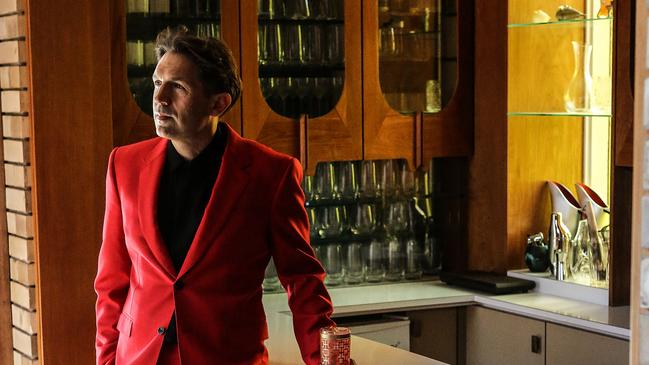
When I first started at Attica, I remember the feeling of ambition I had as a chef. There was the ambition to be recognised for my hard work, the unrealised ambition to win awards. The night I won my first significant award, although I was terrified, I was beyond excited. It felt like a great privilege to receive recognition for my work and the work of our tiny team.
After the ceremony, I was invited for a drink with a group of famous older chefs, who said, ‘Enjoy this moment, young man, it doesn’t get any better than this.’ There was an underlying sadness in their club. It felt like the elation of winning awards was the only feeling they lived for. I felt so uncomfortable that I wanted to escape. It seemed to me that they were trapped by their success; while they knew that awards were fleeting, they were helplessly addicted to them, powerless to wrestle back their own narrative and find the original source of joy that brought them to this in the first place: food.
They had lost touch with their passion for cooking, gotten swept up in the hype that had begun to surround chefs of that time. Although they belonged to the second generation of well-known Australian chefs, they were perhaps the first to become celebrities, more famous than their famous restaurants.
At the centre of this is food media. It has played perhaps the biggest part in the building of chef legend. My approach with food reviewers is to be polite and respectful, but I never confuse these pleasantries with friendship – you cannot be friends with someone who is being paid to make judgments about your restaurant. I maintain a professional distance, out of deference for the job they feel they must do.
Of course, being a food reviewer could, and should, be an amazing job, spending one’s life eating unique food, learning and writing about food culture and history, the major challenges facing the way we eat and the thoughtful storytelling of restaurants. The reality of how it is usually done, however, is very different. Many food reviewers justify their role as a service to the public, but few grasp the responsibility and privilege they have. Often, they work with little expertise. It takes a minimum of fifteen years of continuous focus to get good at all aspects of cooking; it can take a food critic one sideways promotion to find themselves in a position where they are judging the results of that cooking.

Over time, I have begun to call these people ‘Jimmy’. One day Jimmy might be a reporter who gets promoted to ‘chief food critic’ because it’s known in the office that they are an adoring ‘foodie’. They wax lyrical about ‘the croissant’. On Monday mornings, they bore everyone in the office with their weekend farmers market exploits. Their Christmas party BBQ skills are legendary. Once Jimmy has mastered sous vide at home, they decide that they would make a great food reviewer. The hospitality industry collectively sighs, the fate of our future is now in the hands of Jimmy. Jimmy is almost always white. Life has been good to Jimmy. Things just fall into place, and why wouldn’t they, hey? Jimmy has been afforded every privilege.
‘Jimmy’ doesn’t represent every food critic, of course, but does reflect my experience of some of the most powerful reviewers at major news sources and restaurant guides. As the editor of a leading restaurant guide recently said to my partner Kylie and I, ‘You don’t need a background in food writing to review and write about restaurants.’ This person had taken the editor position after working as a direct-to-camera journalist for a television news station. That’s an even bigger leap than me deciding that tomorrow I’ll go from being a chef to head sommelier – unthinkable, and seriously you don’t want me selecting or serving your wine. The arrogance behind assuming such a position of authority so readily undervalues the mastery of restaurants, as if they are such a basic and easy-to-understand part of our culture that it takes no specialist knowledge to make informed critiques about them.
This is about Jimmy. It’s about the sour impact food media has had on restaurants, the perils of hats, stars, and best-of lists. It’s also a call to our industry to step up and take control, to stop pandering to a system that no longer works, that was never truly independent, never properly informed, and never quite offered the expertise it claimed to. Like Santa Claus, Jimmy is based on myth. As soon as you stop believing in him, he stops giving you presents. But the more we buy into this system, the more ownership it has over us. Have you been naughty, or nice, this year? It only works while we buy into it. There’s a phrase that enters my head when I think about hat ratings and accolades, and all that has been bestowed on me and Attica by these Jimmys: most climbers are killed on the descent.
I was fortunate to get to know a hero of mine: Jonathan Gold, the belly of Los Angeles, food critic of The Los Angeles Times. In the food world, Jonathan was my favourite person to talk with, because nothing was wasted. The openness of his interest and the immediacy of his knowledge meant that in a world full of noise, his transmission was the clearest.
Jonathan wasn’t only a gifted food critic: he was admired and respected by our gang for the humanity he brought to his profession. I think most chefs and restaurant owners sensed that they actually mattered to him; he knew that, in their distilled essence, restaurant reviews were stories about people, and those people have livelihoods. In the documentary of his life, City of Gold, he makes no secret of his love for those in the restaurant business: ‘You want these guys to succeed.’ Yet he is equally honest about his work: ‘I’ve burned good friendships over bad reviews. You just have to be willing to do it.’
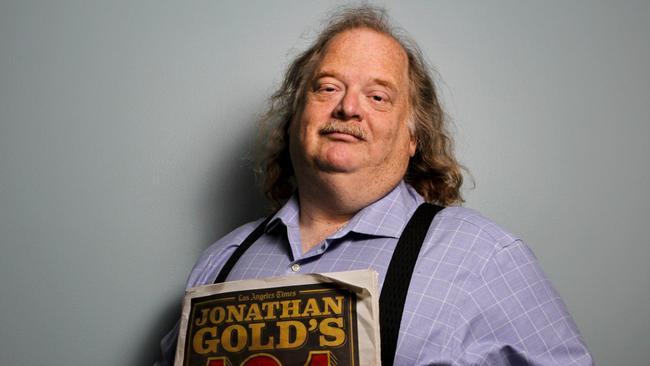
Jonathan sought out diverse and often small restaurants, visiting them five or six times before reviewing them. While he researched meticulously, if he wasn’t knowledgeable about the type of food they were serving, he didn’t pretend to be, and would visit many more times, admitting his ignorance and showing respect for their culture. With deep love, he elevated his city’s brilliant and exciting food culture, and brought attention to the meaningful work of restaurants and food trucks serving their local communities.
In Australia, we’ve never had a Jonathan Gold – but that’s not surprising, as nowhere except Los Angeles has had a Jonathan Gold. LA was Jonathan Gold and Jonathan Gold was LA. I’d love to see a food critic here put a city ahead of themselves in that way. Too often critics are not truly interested in the culture of a place. More commonly, they are people who celebrate their own manufactured culture, or self-interested people, or people who have an agenda, rather than searchers with an open and curious mind, on a mission to discover the best of a city and link the food to its citizens.
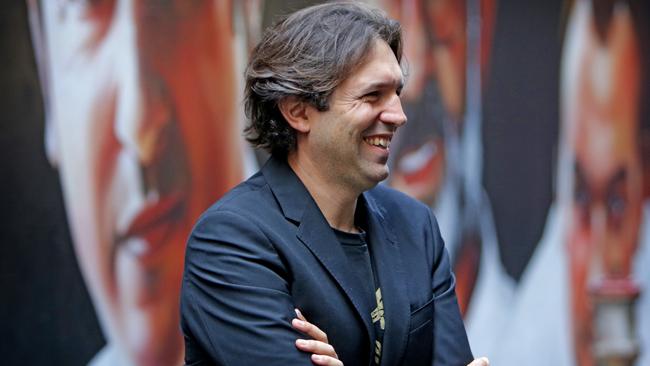
The key to becoming a chef who can elevate dishes from good to great is a highly evolved palate, the ability to taste and differentiate flavours and to make the correct calls on the adjustment of seasoning. The key to becoming a great food critic is the same: it all comes down to palate. Many people incorrectly assume that being a good writer is essential. Certainly, it is helpful, but it is not what makes a critic great. Many excellent writers are poor food critics because they are let down by their palate and their lack of food knowledge. For chefs and critics alike, palate is everything.
The global restaurant industry has spent too long in the thrall of food media. It is a feckless system, built on hype. There are conflicts of interest everywhere. Experience and insight are almost non-existent. To those writing, it often seems like a game: who’s up and who’s down, who’s worth a story because they have lost a hat; who has a pungent little line about how a dish was seasoned, or how the front-of-house were dressed; a joke that was too funny not to write, even if it wasn’t quite true, even if it wasn’t really funny – because to them, not being noticed is death.
Behind this desire for attention, though, are real consequences. It might sound like hyperbole, but this oppressive review system – the same one that has brought privilege and fame to a few chefs like me – has contributed to bankruptcy, divorce, depression and suicide. The stress and tension that restaurants often find themselves under are greatly intensified by the huge businesses that review us, businesses that want to sell more newspapers, magazines, or tyres – ratcheting and ratcheting and ratcheting up the pressure, which sadly has been too great for some.
Much the same sort of arbitrary scoring system exists in every food city. Hats replace stars, stars replace hats, 50 best whatever replaces a vapour of nothingness. Publications award restaurants scores out of 20 and chef’s hats or stars from one to three. This system is hard to explain and it seems like no one, including the reviewers, knows how it works. You could be awarded a hat for making a sandwich or a hat for an ambitious restaurant cooking at the highest level. This just makes a hat seem arbitrary and meaningless. Why not just say these two very different businesses are great at what they do, and leave it at that?
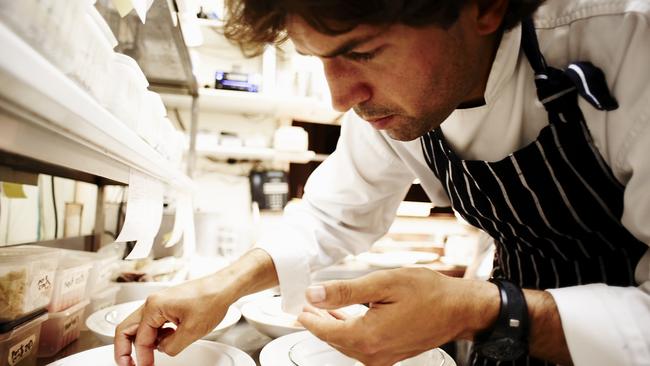
Restaurants swallow the pill – we dare not speak out about it – and Jimmy understands their entitlement and position of power all too well. The merry-go-round of reviewers, guides, stars, hats, lists of top anything or world’s best, all serve one thing and one thing only – themselves, their self-generated hype. They are constantly coming up with new ways to sell to you, and to use us. The churn and burn of superficial commentary is extraordinary: different reviewers, different organisations, but the same stale, decades-old system. Hospitality is the only industry I can think of where businesses get reviewed by major publications several times annually, year on year, for eternity.
When I took ownership of Attica in 2015, as part of my business plan, I wrote a list of the threats to our prosperity. Number one was a bad review, even after so many years of excellence and Attica winning almost all the awards possible.
Feeling under threat is hardly the sort of nurturing environment that encourages a person to push the envelope creatively. Awards can have the exact opposite effect, in fact – chefs and restaurateurs become paralysed, fearfully working to protect what they have, rather than taking risks to explore what is possible. Recently a chef went on record to state that the restaurant they work for was undertaking a re-fit to the tune of $3 million. His reason was very specific: it was not to provide a nicer environment for their customers, nor a better workplace for their staff, but instead to protect the award they hold.
On one occasion, after Attica won a Restaurant of the Year award, I thanked an editor, who sniggered and said, ‘Let’s see if you can keep it.’ He had given me something that wasn’t mine; it was his. He was the kingmaker, and he was letting me know it.
I’m not proud of the things I have done to comply with the system over the years. I can justify it in anyway I want to, that I do it to keep the lights on, that I do it begrudgingly, but this is also a story of my complicity.
But the industry has begun to turn. At one recent such event I remember the crowd was rowdy. Football-fan-level rowdy. A food critic stood on a stage in front of the mob and tried in vain to speak over the noise. The mob is the restaurant industry, and it appears to have absolutely no appetite for what the food reviewers have to say. Individually, of course, we’d never dare to be so disrespectful, but collectively the crowd seemed to be saying a noisy, two-hour f**k you to the reviewers. It’s more like a scene from an anti-vax protest than a gathering of the finest chefs, waiters and restaurateurs in town.
The reviewers didn’t understand what was happening and looked a bit shaken. A decade earlier, this contempt would have been unthinkable, but in this time I understand perfectly: we’ve all been cooped up for two years and are about to be served another round of their reviewing hype-beast bullshit.
The awards were being called out, always with more suspense than necessary, to make it as painful as possible for all involved. When it was announced that Attica was awarded two hats, down from three, a brief hush fell over the room. I feel strangely freed by the demotion.
If the fake, shiny things in the restaurant world had lost their shine before 2020, then the belt-sander force of nature that appeared in March of that year ripped off the remaining varnish and left only hard rubbish. Covid-19 led to dining rooms being inverted, and what we thought we knew was so soundly shaken from its foundations that I was forced to question everything, especially Attica’s relationship with restaurant guides.
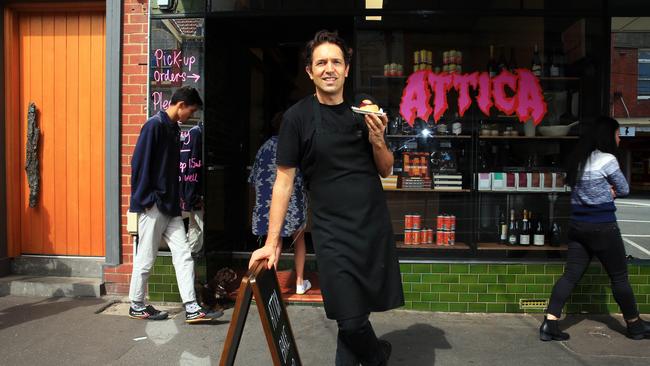
As the restaurant industry was plunged into an abyss, the silence from these guides was deafening. The institutions that had built their businesses on writing about us – judging, selling, using and pigeonholing us – disappeared overnight. Collectively, we realised that we were alone. The feeling was f**king wild. My longheld suspicion that the guides were more dependent on us than we were on them was vindicated.
Globally, restaurants continued to serve their customers however they could, through takeaway and whatever side hustles they could manage – but the guides, whose professional identity relies on our work, they did nothing. Without restaurants functioning as restaurants, they had nothing to do, no one to write about. With the realisation that their business model really was as shallow as I felt it was, the power swung swiftly in our direction.
We soon learnt that our restaurant could continue to innovate with new dishes and projects, as well as get by financially, in the absence of the major publications. For two years, restaurants in Australia received respite from being reviewed for guides. For the first time in my 27-year career, I was living without the pressure of an impending visit from a restaurant critic. During this period Attica was judged by the only two sources that truly matter: our customers and ourselves.
This feeling of freedom was widely shared among restaurant people. I came out of this time more resolute than ever not to give a f**k about the things that really don’t matter, and to care more than ever about the things that really do: love, kindness and independence, and a vibrant and thriving restaurant – a creative enterprise that earns the right to do exactly what it wants, answering only to its staff, customers, community and environment, but never again beholden to or reliant on the global restaurant-reviewing machine.
Perhaps there was a time to care about what food critics said. That time was at least a decade ago. Ever since I received my first award, my unease with the system has gradually grown, with every annual ‘review season’ and award adding to my private anxiety, like the apologue of the frog in hot water, where the temperature rises incrementally until the frog is boiled alive.
For a long time I’ve been pushing these thoughts away, reluctant to speak out because to write a ‘takedown’ of the system that I have benefited from for more than a decade feels disingenuous. After all, it is partly because of this system that I am here, with this platform, to speak of these experiences. Attica is one of the most-awarded restaurants in Australian history. A fair question is, ‘But why, if you’ve always felt this way, did you not just turn down the awards, rather than accepting them?’ My answer would be that this system existed well before I entered the industry, and initially I did not completely understand it. I thought it was all-powerful, and I did not have the same courage of my convictions that I have now.
Attica continues to push the boundaries of what is possible within food, service, art and culture. That’s not to say that I think it’s better or worse than any other restaurant, nor do I think that I’m too big to fail, or that I’m above criticism. Quite the opposite: our paying customers have the right to criticise our work via many means if they desire but I’m asking: who will hold the critics to account if judgments made about us are ill-informed or unjustified? It’s about questioning who holds the authority: the guides who think they uphold the standards, or restaurants themselves?
Uses for Obsession: A Chef’s Memoir by Ben Shewry is out today via Murdoch Books ($34.99)




To join the conversation, please log in. Don't have an account? Register
Join the conversation, you are commenting as Logout